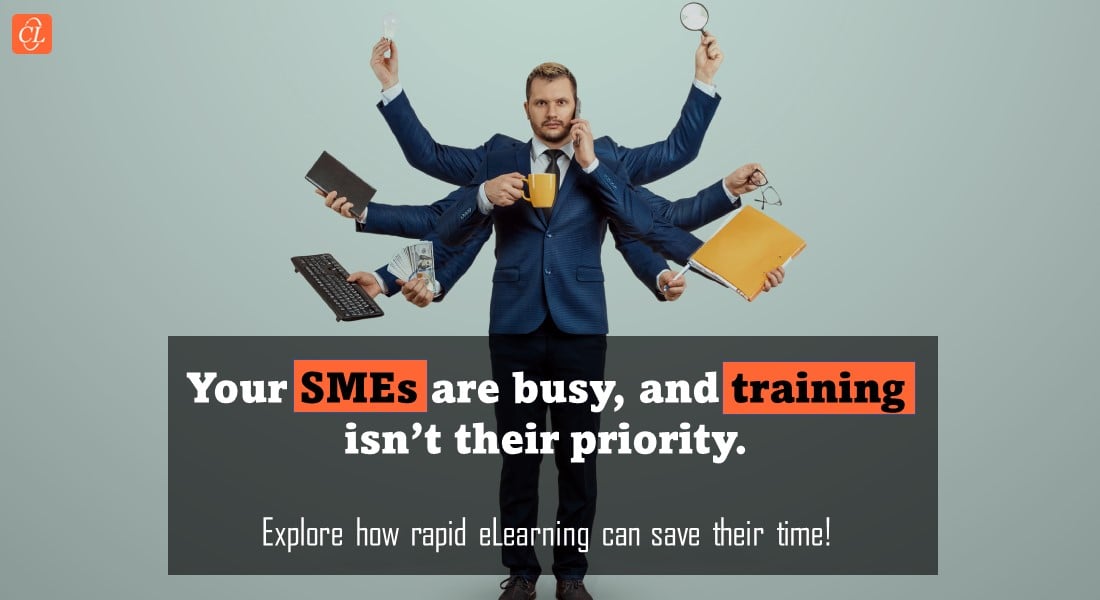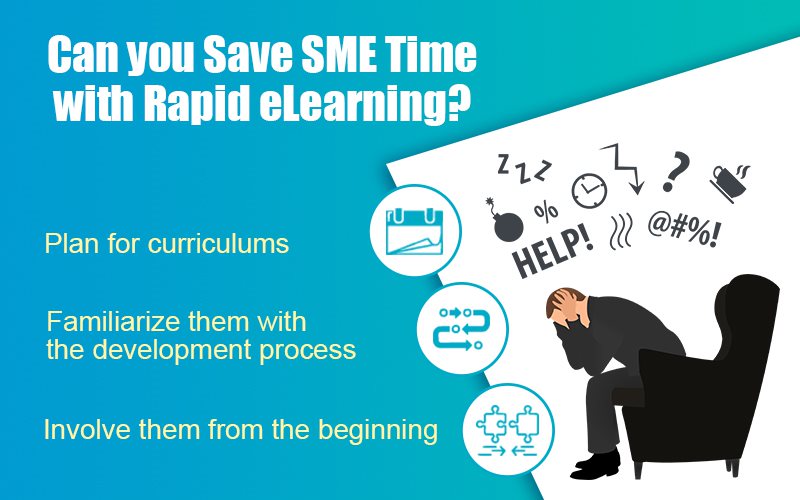How Rapid eLearning is Effective to Secure the SME’s Support

Companies are always looking to deliver high-quality training to upskill or reskill their employees. eLearning is a vital part of corporate training. eLearning development might sound easy but to create a successful learner-centric course, a lot of expertise is required. Subject matter experts (SMEs) are the people who hold the expertise to ensure the courses are logically and factually correct. Despite having such a critical role in the eLearning department, it’s challenging to collaborate with them. Rapid eLearning helps to save an SME’s time because it follows an agile project management process and makes their inclusion somehow less challenging. This blog shares insights on how rapid eLearning is capable of saving so much time for SMEs.
Are Your SMEs Not Making Enough Time for Your eLearning Course Development?
Learn how rapid eLearning helps to save an SME’s time.
- Preferring curriculums over standalone courses
- Involving SMEs in the brainstorming phase
- Familiarize SMEs with rapid eLearning development process
- Using Online Review Tools
Read on to understand how these practices save a lot of time for SMEs.
Who Are SMEs?
Even though SMEs play such an important role, the development of eLearning courses is not their primary responsibility. They are not formally obliged to be a part of L&D. A lot of SMEs are either stuck on their conventional methods of training formats and don’t plan on switching to eLearning anytime soon while the other lot can be least interested to be actively involved in any sort of L&D processes. The final lot are the ones who are too secure and specific when it comes to delivering their work, which is indeed a good thing, yet challenging.
SMEs hold expertise in particular domains and are responsible for providing the main training course content. Apart from providing the content, they are also the final approvers and reviewers of the course. The personality of these SMEs might differ relatively, but one thing is common in everyone’s case, their availability and time commitment is exceptionally limited. SMEs spend most of their time traveling to different places to solve their premium client issues. It’s natural for them to not prioritize the development, approval, and reviewal of complex eLearning courses.
How Rapid eLearning Saves Time for SMEs?
1. Preferring curriculums over standalone courses
Rapid eLearning development prefers curriculums over standalone courses so that SMEs don’t have to spend more time working with standalone courses because they are spaced over a certain period. Whenever the course has to be delivered, the SMEs would have to repeat multiple processes such as providing input for the core course content, course designs, and the end reviews. Instead, when you choose to plan a curriculum, there is no repetition of processes. Decide on some standard designs and the structure so that the SME has fewer aspects to review, that too just once. Here are the few things an SME still has to approve:
- The technical terminologies and content fillers
- Interactivities
- Assessments
- Specific strategies to simplify complex concepts
This eBook will help you select the right rapid authoring tool for your eLearning course development.
2. Involving SMEs from the kick-off phase
A common mistake that training managers do is to involve SMEs after they have planned the whole layout of the course along with the instructional design strategies they are going to follow. It causes the SMEs to indulge deeply in the course content and might waste a considerable amount of time if the strategies don’t match the flow of the course or if they disagree with the structure. Rapid eLearning follows iterative project management processes so involving SMEs with the stakeholders before the development process or in the initial brainstorming stage can ensure multiple benefits such as:
- Gaining clarity on training goals and expectations, so there is no confusion mid-development or when the courses are delivered.
- Becoming familiar with the review tools(in case any external online tool is used).
- Discussing the generalized content in the initial meetups so that they don’t have to give any extra time for reworks and updates.
- Scheduling their timelines for future reviews.
- Getting to know the in-house team better, to have a clear idea of whom to contact when in need of anything.
3. Familiarize SMEs with rapid eLearning development processes
SMEs can sometimes get possessive with their content and the ways they wish to have it delivered. Moreover, SMEs prefer classroom training over any other format, so rapid eLearning is pretty much out of their horizon. Though this issue isn’t critical as you can explain the design and development processes with a practical approach. These are the few aspects tied with rapid eLearning processes you need to help SMEs with:
- Adult learning principles and the impact of rapid authoring tools.
- How learner engagement can directly impact the productivity of training courses.
- Preferring need-to-know content over nice-to-know information.
- Latest eLearning trends and technological advancements.
4. Using Online Review Tools
It’s a forever hassle for SMEs to share feedback through emails after they review the storyboards through docs or PPTs. Rapid eLearning development saves them from this hassle as most modern rapid authoring tools have in-built review apps like Articulate Review 360, and Trivantis ReviewLink. There are external online review tools available as well if your preferred authoring tool doesn’t have it embedded, like Review My eLearning. These tools can help SMEs to:
- Collaborate easily among other SMEs and Stakeholders to resolve any conflicting opinions.
- Save all the feedback and reviews in one place on the cloud data.
Parting Thoughts!
Involving SMEs in your eLearning development is indeed a struggle, but it’s close to impossible to develop eLearning courses without their support. Making them aware of modern technologies and methods like rapid eLearning is always a good idea for the training managers to have the courses developed with ease. Always make sure you acknowledge the importance of SMEs, appreciate their contribution, and most importantly try not to waste their time. Access this free webinar recording to find out how to make the most of their limited time.





